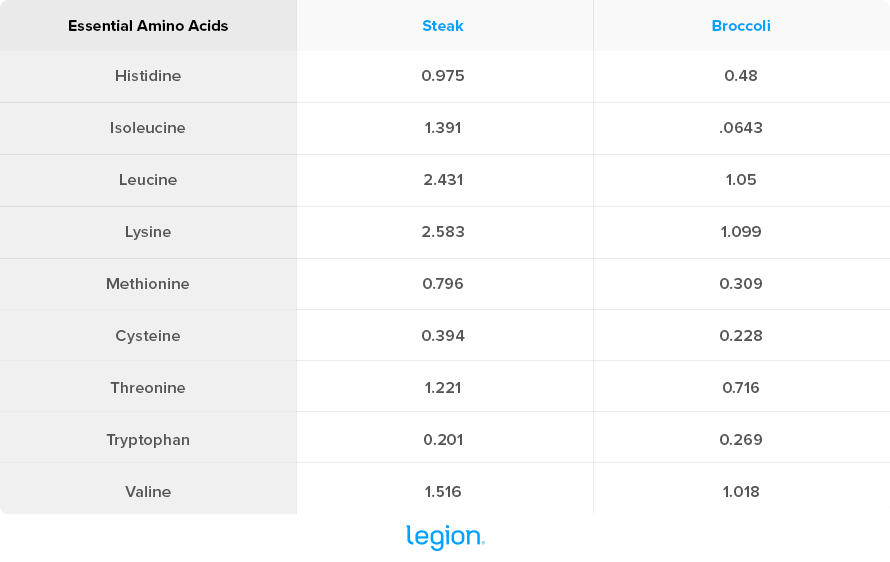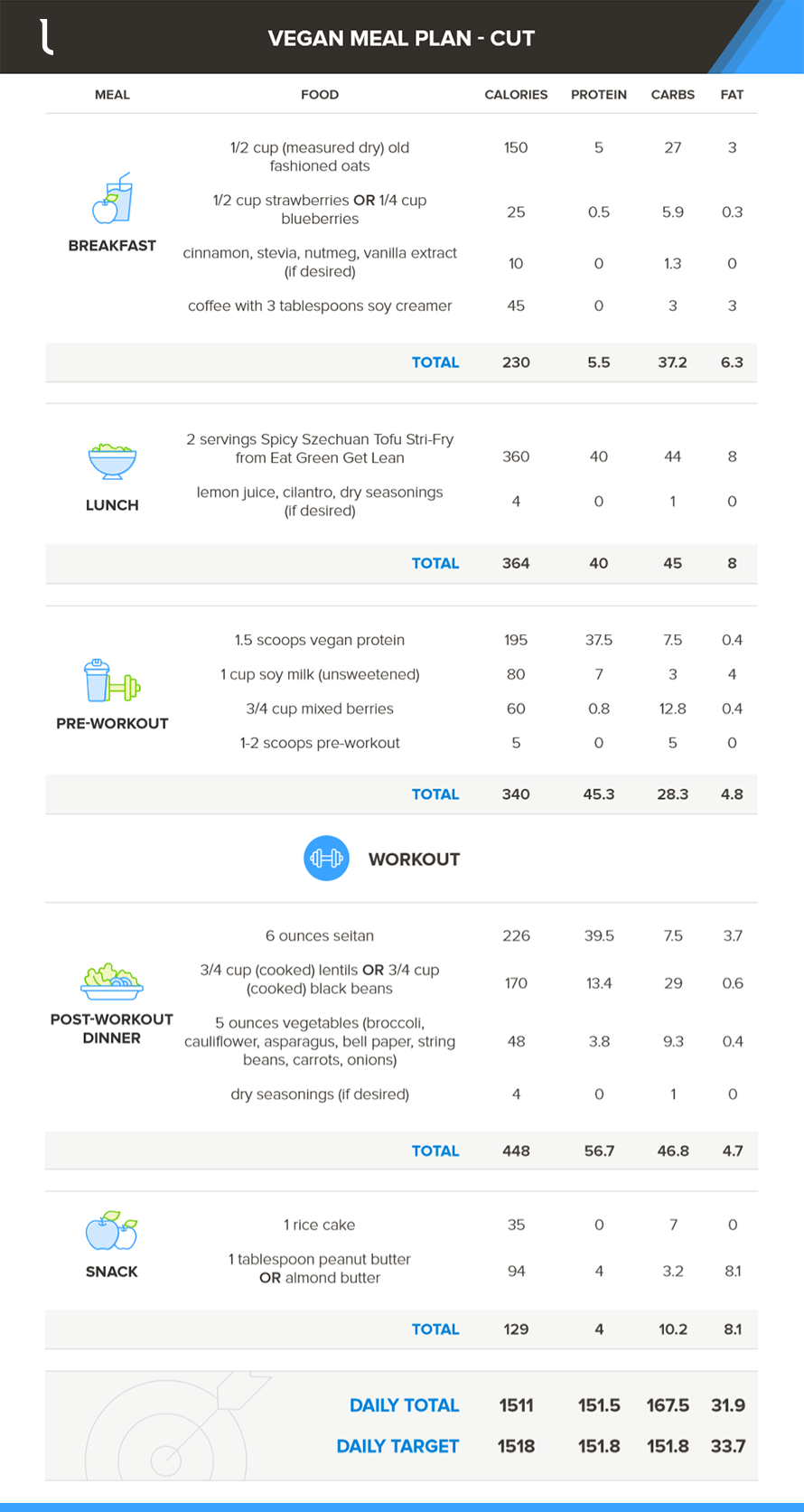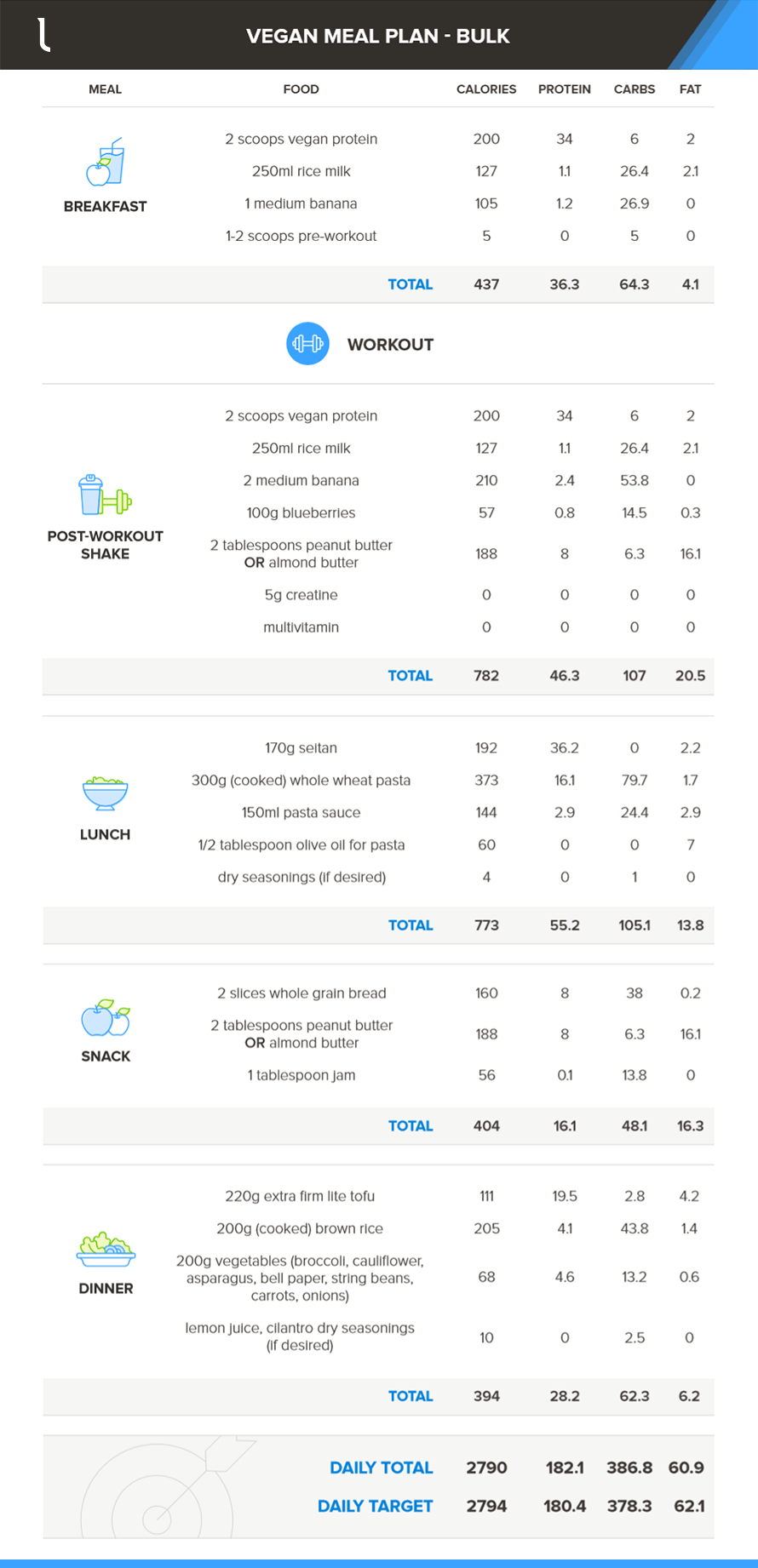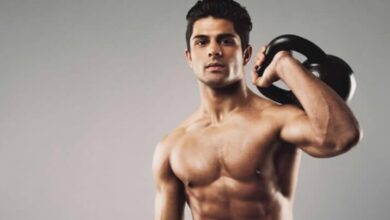The vegan bodybuilding diet for maximum muscle building

Many people think veganism and bodybuilding are mutually exclusive.
Do you know how oil and water. . . Toothpaste and coffee. . . Apple and Microsoft. . . Anathema.
Well you are wrong. You can absolutely do both. But you have to know what you are doing.
That's because vegan bodybuilding diets are easier to screw up than the traditional omnivorous approach, and if you don't understand and address the cons and limitations of the vegan diet in the context of bodybuilding, you will get disappointing results.
However, if you do, and plan and adjust accordingly, you will have no problem Muscle building, Lose fat, and get strong.
And that's exactly what this article is about.
You will learn there. .
- What a Vegan bodybuilding diet is
- How to get a vegan bodybuilding diet up and running (including how to get your vegan macros, how to get protein as a vegan, and what additions to your vegan bodybuilding meal plan)
- Whether you should avoid soy protein or not, not
- So you plan vegan bodybuilding meals (with some examples)
What is a vegan bodybuilding diet?
The goal of any bodybuilding diet is to provide the body with the nutrients it needs to maximize muscle growth and minimize fat build-up. Since protein is the main macronutrient for muscle growth, bodybuilding diets typically contain many high protein foods, such as meat, fish, eggs, and dairy products.
A vegan bodybuilding diet is very similar, only instead of a lot of protein-rich foods from animal sources, it contains many protein-rich foods from plant sources.
Would you like a free tool for individual meal planning?
Quickly calculate your calories, macros, and even micros to lose fat and build muscle.
Your free stuff is on the way!
Apparently you've already subscribed!
How to make a vegan bodybuilding diet work for you
The main reasons people fail to follow a vegan bodybuilding diet are: .
- They don't know how to theirs vegan macros
- they do not know how to get protein as a vegan
- They don't know what supplements to take
However, follow these five science-based tips and you will avoid all of the pitfalls associated with building muscle as a vegan.
1. Determine your daily calories.
There are many different ways you can find out, but the easiest way is to get your stats and goal into that Legion calorie calculator.
All you have to do is enter your gender, weight, height, age, activity level and goal (“lose fat”, “build muscle” or “maintain the same weight”) and the calculator will estimate. . .
These numbers are based on the fact that. . .
- If you want to lose weight, you should be consuming 75 to 80% of your TDEE or 20 to 25% less energy than you burn on a daily basis.
- If you want to gain weight, you should be consuming 110 to 115% of your TDEE, or 10 to 15% more energy, than you are burning.
- And if you want to keep your weight off, you should be eating 100% of your TDEE, or more or less exactly what you burn on a daily basis.
2. Eat a high protein diet.
Dozens of well-designed, peer–checked Studies have shown beyond any doubt that a high protein diet is better for building (or maintaining) muscle and losing fat than a low protein one.
Unfortunately, a lot of vegans die on the way here because, despite what vegans often preach, vegetables are not a great source of protein.
Not only that, but also the protein protein found in plants is not absorbed by the body as well as protein from animal sources.
This double punch is one of the main reasons for vegan protein sources are not that effective to build muscle as an animal protein source.
One way to fill the gap is to eat more protein on a vegan bodybuilding diet than on an omnivorous bodybuilding diet.
Specifically, try to consume at least 1 to 1.2 grams of protein per pound of body weight per day.
3. Eat foods high in leucine.
Getting enough total protein is only part of the vegan protein puzzle – you also need to eat foods that are high in the essential amino acid Leucine.
Leucine stimulates directly Protein synthesis via the activation of an enzyme that is responsible for muscle growth known as Mammalian target of rapamycin, or mTOR.
Therefore research shows that the leucine content of a meal directly influences the amount of amount Protein synthesis that arises from it.
In other words, meals high in leucine have a higher potential for muscle building than low-leucine meals.
This is the other main reason vegan protein sources are inferior to animal protein sources for building muscle: they tend to be low in leucine and other essential amino acids.
To illustrate this point, let's compare the protein in broccoli to the protein in beef.
Here's what 275 calories from each (4 ounce steak vs. just over 9 cups broccoli) get you in terms of essential amino acids:
The best solution to this problem is to eat plenty of vegan foods that are both high in easily absorbable protein and high in leucine, such as: . .
The Best Sources of Protein for a Vegan Bodybuilding Diet:
- Vegetable protein powder
- Vital wheat gluten
- oats
- Soybeans
- lenses
- Navy beans
- Kidney beans
- peanuts
- Black beans
- Mung beans
4. Eat enough fat and compensate your calories with carbohydrates.
Setting up your vegan macros Building muscle isn't just about protein – you also need to eat enough fat and carbohydrates.
That's because . . .
Here's how to make sure you get enough of both:
Fat: Eat about 0.3 grams of fat per pound of body weight per day. This is enough to support overall health and wellbeing, but not so much that you need to unnecessarily cut protein and carbohydrates to stay within your calorie limits.
Some of the best sources of fat for a vegan bodybuilding diet are:
- avocado
- Walnuts
- Peanuts or peanut butter
- Almonds or almond butter
- Pistachios
- Cashew nuts
- Tahini
- olive oil
- Sunflower seeds
- Pumpkin seeds
Carbohydrates: Assign any calories that you didn't use for protein or fat to carbohydrates.
Once you know that one gram of protein and carbohydrate are both around 4 calories and one gram of fat is around 9 calories, figuring out your carbohydrates is pretty easy. All you have to do is . .
- Multiply your protein goal by 4.
- Multiply your fat goal by 9.
- Add these together and subtract the sum from your total calories (the number you got from the Legion calorie calculator earlier) tells you the number of calories you have for carbohydrates.
- Divide that remaining number by 4 to get the number of grams of carbohydrates you should be consuming each day.
Let's look at an example of how this happens.
I weigh around 190 pounds and my TDEE is around 2,700 calories, which is roughly what I eat every day to maintain my weight and body composition.
I need to eat around 190 grams of protein and 60 grams of fat a day, and this is how I calculate my carbohydrates:
190 x 4 = 760
60 x 9 = 540
760 + 540 = 1,300
2,700 – 1,300 = 1,400 remaining calories for carbohydrates.
1,400 / 4 = 350 grams of carbohydrates per day.
So my macros are:
- 190 grams of protein
- 60 grams of fat
- 350 grams of carbohydrates
Some of the best sources of carbohydrates for a vegan bodybuilding diet are:
- Potatoes (sweet and white)
- oats
- Rice (brown, white, wild)
- bulgur
- Andean millet
- Spelt
- Amaranth
- Whole wheat pasta and bread
- Vegetables like broccoli, carrots, kale, mushrooms, and cauliflower
- Fruits like bananas, apples, berries, pineapples and oranges
5. Take the correct nutritional supplements.
It is not uncommon for people on a vegan diet to be deficient in some vitamins and minerals such as: . .
You've probably also heard that these common deficiencies in vegans can be avoided simply by adding certain foods to your diet.
That's true up to a point, but it's easier said than done.
For example the calcium in some vegetables is not that bioavailable than calcium in dairy products (and in any case multiple servings of vegetables are needed to make up a single serving of milk).
Plenty of vegetable sources of iron and zinc are also inferior animal sources and must be consumed in large quantities.
Omega-3s are mainly found in animal products, and the main vegan source of this vital type of fat is alpha-linolenic acid, the is badly received through the body.
All of this means that if you want to optimize your health and performance on a vegan diet, you have two options:
- Adjust your diet so that you consume generous amounts of foods high in the nutrients listed above.
- Complement.
Personally, I would choose door number two because it is simple and relatively inexpensive, but if you are a staunch anti-nutritional supplement type, you will need to invest extra time in your meal planning to ensure you are getting adequate amounts of the many vital nutrients that are that your body needs.
Here are some of my recommended sources of hard-to-get nutrients on a vegan diet:
- Vitamin B12: dietary supplement, fortified grain.
- Vitamin D: supplement.
- Calcium: edamame, tofu, sesame, almonds, spinach and pak choi.
- Riboflavin: almonds, mushrooms, fortified cereals.
- Iodine: seaweed (especially kombu seaweed), iodized salt.
- Iron: beans, plums, fortified cereals.
- Zinc: soy products, nuts, seeds, mushrooms and lentils.
- Essential fatty acids: ground flaxseed and walnuts, but I would recommend a seaweed oil instead (although this can be expensive).
- Creatine: supplement
- Anserin: supplement
- Taurine: supplement
- Carnosine: supplement
The other supplement that is definitely worth including in yours Vegan bodybuilding nutrition plan is vegetable protein powder.
There are umpteen different vegetable protein powders on the market these days, with some of the most popular options being soy, hemp, pea, rice, and quinoa protein powders.
Instead of going in the pros and cons of eachTo get straight to the point, the best plant-based protein powder for building muscle is a mix of rice and pea.
Not just rice and pea mixes light digested, they contain high amounts of the essential amino acids leucine, isoleucine and valine, which make them particularly good for building muscle.
Hence it is not surprising that research shows a mix of pea and rice protein is about as effective as Whey protein to build muscle.
If you're looking for a high protein, natural, nutritionally fortified vegetable protein powder that is also delicious to drink, check out Legion's 100% natural vegetable protein powder. Plant +.
A quick word on soy protein
Soy protein is a mixed bag.
It is a all-round good source of protein for building muscle, but it's also a source of ongoing controversy.
Something Studies show that regular consumption of soy products has a feminizing effect on men. . . Other research shows that it doesn't change anything about changing male hormone levels. . . And other things too Studies show that it helps normalize estrogen levels by either suppressing or increasing production as needed.
Hence, it's hard to tell whether or not soy-based products will be a good addition to yours vegan bodybuilding meal plan.
What we do know, however, is the effects it can have vary depending on the presence or absence of certain intestinal bacteria. Found in 30 to 50% of people, these bacteria metabolize an isoflavone in soy called daidzein into an estrogen-like hormone called equol, which causes Testosterone levels drop and estrogen levels rise. . . at least in men.
For women, research suggests that regardless of equol production, it is less likely to adversely affect hormones, so there is nothing to be concerned about here.
All in all, I'd say avoiding soy protein entirely is probably unnecessary.
So why not choose something else when there are so many other sources of plant-based protein?
If you want to learn more about the best sources of protein for vegan muscle building, check out this article:
30 of the best vegan protein sources for building muscle
Example of a vegan bodybuilding meal plan
At this point, you probably want to see something well planned vegan bodybuilding meals, so here are a few that we made for ours Customers with an individual menu.
As you can see, with a little work and creativity, you can hit your macros while avoiding all animal products.
Here is an example of a vegan bodybuilding cut diet:
And here is an example of a Vegan bodybuilding nutrition plan for filling:
+ Scientific references
- MS, K. (2002). Hormonal effects of soy in premenopausal women and men. The Journal of Nutrition, 132 (3). https://doi.org/10.1093/JN/132.3.570S
- Liu, B., Qin, L., Liu, A., Uchiyama, S., Ueno, T., Li, X. and Wang, P. (2010). Prevalence of the equol producer phenotype and its relationship to dietary isoflavone and serum lipids in healthy Chinese adults. Journal of Epidemiology, 20 (5), 377-384. https://doi.org/10.2188/JEA.JE20090185
- CL, F., C, A., WK, T., A, G., T, J., K, W., SM, S., SS, L. & JW, L. (2005). High agreement of the daidzein-metabolizing phenotypes in individuals at an interval of 1 to 3 years. The British Journal of Nutrition, 94 (6), 873-876. https://doi.org/10.1079/BJN20051565
- CS, H., HS, K., HJ, L., SH, L., YS, K., TB, C., HG, H. & KO, H. (2006). Isoflavone metabolites and their dual function in vitro: They can act as an estrogen agonist or antagonist, depending on the estrogen concentration. The Journal of Steroid Biochemistry and Molecular Biology, 101 (4-5), 246-253. https://doi.org/10.1016/J.JSBMB.2006.06.020
- JM, H.-R., G, V., SJ, D., WR, P., MS, K. & MJ, M. (2010). Clinical studies show no effects of soy protein or isoflavones on reproductive hormones in men: results of a meta-analysis. Fertility and Sterility, 94 (3), 997-1007. https://doi.org/10.1016/J.FERTNSTERT.2009.04.038
- M, M. (2010). Soybean isoflavone exposure has no feminizing effect on men: a critical review of the clinical evidence. Fertility and Sterility, 93 (7), 2095-2104. https://doi.org/10.1016/J.FERTNSTERT.2010.03.002
- JE, C., TL, T., SM, S. and R, H. (2008). Soy feed and isoflavone intake in terms of semen quality parameters in men from an infertility clinic. Human Reproduction (Oxford, England), 23 (11), 2584-2590. https://doi.org/10.1093/HUMREP/DEN243
- JE, T., DR, M., GW, K., MA, T. & SM, P. (2009). Ingestion of whey hydrolyzate, casein, or soy protein isolate: Effects on mixed muscle protein synthesis at rest and after resistance training in young men. Journal of Applied Physiology (Bethesda, Md .: 1985), 107 (3), 987-992. https://doi.org/10.1152/JAPPLPHYSIOL.00076.2009
- JM, J., RP, L., JM, W., M, P., EO, D.S., SM, W., DS, K., JE, D. & R, J. (2013). The effects of 8 weeks of whey or rice protein supplementation on body composition and exercise performance. Nutritional Journal, 12 (1). https://doi.org/10.1186/1475-2891-12-86
- Babault, N., Païzis, C., Deley, G., Guérin-Deremaux, L., Saniez, M.-H., Lefranc-Millot, C., & Allaert, F. A. (2015). Oral Diet Pea Protein Supplements Promotes Muscle Thickness During Strength Training: A Double-Blind, Randomized, Placebo-Controlled Clinical Trial Versus Whey Protein. Journal of the International Society for Sports Nutrition 2015 12: 1, 12 (1), 1–9. https://doi.org/10.1186/S12970-014-0064-5
- Okuda, M., & Wang, D. (n.d.). Rice Protein – An Overview | ScienceDirect Topics. Retrieved July 7, 2021 from https://www.sciencedirect.com/topics/agricultural-and-biological-sciences/rice-protein
- F, M., ME, P., D, T., S, B., R, B. & S, M. (2001). The influence of the albumin fraction on the bioavailability and postprandial utilization of pea protein selectively administered to humans. The Journal of Nutrition, 131 (6), 1706-1713. https://doi.org/10.1093/JN/131.6.1706
- JR, H. (2003). Bioavailability of iron, zinc and other trace elements from a vegetarian diet. The American Journal of Clinical Nutrition, 78 (3 Suppl). https://doi.org/10.1093/AJCN/78.3.633S
- Weaver, C.M., Proulx, W.R. & Heaney, R. (1999). Choices for Achieving Adequate Calcium Intakes on a Vegetarian Diet. The American Journal of Clinical Nutrition, 70 (3), 543s-548s. https://doi.org/10.1093/AJCN/70.3.543S
- Pasantes, H., Quesada, O., Olea, R.S. & Alcocer, L. (n.d.). (PDF) Taurine content in foods. Retrieved July 7, 2021 from https://www.researchgate.net/publication/279550569_Taurine_content_in_foods
- Y, H., W, H., S, H. & G, W. (2019). Composition of polyamines and amino acids in plant foods for human consumption. Amino acids, 51 (8), 1153-1165. https://doi.org/10.1007/S00726-019-02751-0
- DG, B., PD, C., G, P., DG, C., D, M. & M, T. (2003). Effect of creatine and strength training on muscle creatine and performance in vegetarians. Medicine and Science in Sport and Exercise, 35 (11), 1946–1955. https://doi.org/10.1249/01.MSS.0000093614.17517.79
- MS, R., Z, L.-W., PN, A., TA, S., NE, A. & TJ, K. (2005). Long chain n-3 polyunsaturated fatty acids in plasma in British meat-eating, vegetarian and vegan men. The American Journal of Clinical Nutrition, 82 (2), 327-334. https://doi.org/10.1093/AJCN.82.2.327
- M, F. & S, S. (2015). Full Life Cycle Vegetarian Diet: Effects on Zinc Intake and Status. Advances in Food and Nutrition Research, 74, 93-131. https://doi.org/10.1016/BS.AFNR.2014.11.003
- R, H., & I, E. (2010). Iron bioavailability and nutritional reference values. The American Journal of Clinical Nutrition, 91 (5). https://doi.org/10.3945/AJCN.2010.28674F
- AM, L., A, L., X, H., LE, B. & EN, P. (2011). Iodine Status and Thyroid Function of Vegetarians and Vegans from the Boston Area. The Journal of Clinical Endocrinology and Metabolism, 96 (8). https://doi.org/10.1210/JC.2011-0256
- Rogerson, D. (2017). Vegan Diet: Practical Advice for Athletes and Exerciseers. Journal of the International Society for Sports Nutrition, 14 (1). https://doi.org/10.1186/S12970-017-0192-9
- WJ, C. (2010). Nutritional Issues and Health Effects of a Vegetarian Diet. Nutrition in Clinical Practice: Official Publication of the American Society for Parenteral and Enteral Nutrition, 25 (6), 613–620. https://doi.org/10.1177/0884533610385707
- E, S. & E, N. (1991). Influence of cobalt-N coordination on cobamide recognition by the human vitamin B12-binding proteins intrinsic factor, transcobalamin and haptocorrin. European Journal of Biochemistry, 199 (2), 299-303. https://doi.org/10.1111/J.1432-1033.1991.TB16124.X
- KR, H., SM, P., MJ, M., D, R., NA, M. & MJ, G. (2010). Influence of glycogen availability on protein turnover in human skeletal muscles during exercise and recovery. Journal of Applied Physiology (Bethesda, Md .: 1985), 109 (2), 431-438. https://doi.org/10.1152/JAPPLPHYSIOL.00108.2009
- LM, B., B, K. & JL, I. (2004). Carbohydrates and fat for exercise and recovery. Journal of Sports Science, 22 (1), 15–30. https://doi.org/10.1080/0264041031000140527
- Berrazaga, I., Micard, V., Gueugneau, M., & Walrand, S. (2019). The role of the anabolic properties of vegetable versus animal protein sources in helping maintain muscle mass: A Critical Review. Nutrients, 11 (8). https://doi.org/10.3390/NU11081825
- LE, N., DK, L., P, B., TG, A., DV, B. & PJ, G. (2009). The leucine content of a complete meal controls peak activation, but not the duration of skeletal muscle protein synthesis and the mammalian target for rapamycin signaling in rats. The Journal of Nutrition, 139 (6), 1103-1109. https://doi.org/10.3945/JN.108.103853
- SR, K. & LS, J. (2006). Signaling pathways and molecular mechanisms by which branched-chain amino acids mediate translational control of protein synthesis. The Journal of Nutrition, 136 (1 Suppl). https://doi.org/10.1093/JN/136.1.227S
- S, van V., NA, B. & LJ, van L. (2015). The anabolic response of skeletal muscles to consuming vegetable versus animal protein. The Journal of Nutrition, 145 (9), 1981-1991. https://doi.org/10.3945/JN.114.204305
- Helms, E. R., Aragon, A. A. & Fitschen, P. J. (2014). Evidence-Based Recommendations For Preparing For A Natural Bodybuilding Contest: Diet And Supplements. Journal of the International Society for Sports Nutrition 2014 11: 1, 11 (1), 1–20. https://doi.org/10.1186/1550-2783-11-20
- SM, P. & LJ, V.L. (2011). Nutritional protein for athletes: from needs to optimal adaptation. Journal of Sports Science, 29 Suppl 1 (SUPPL. 1). https://doi.org/10.1080/02640414.2011.619204
- S, M., N, M. & KD, T. (2010). Increased protein intake reduces the loss of lean body mass during weight loss in athletes. Medicine and Science in Sports and Exercise, 42 (2), 326–337. https://doi.org/10.1249/MSS.0B013E3181B2EF8E
Reader reviews
If you enjoyed this article, we will send you weekly updates. It is free.
Send…
Large! You are subscribed.
100% privacy. We do not rent or share our email lists.






